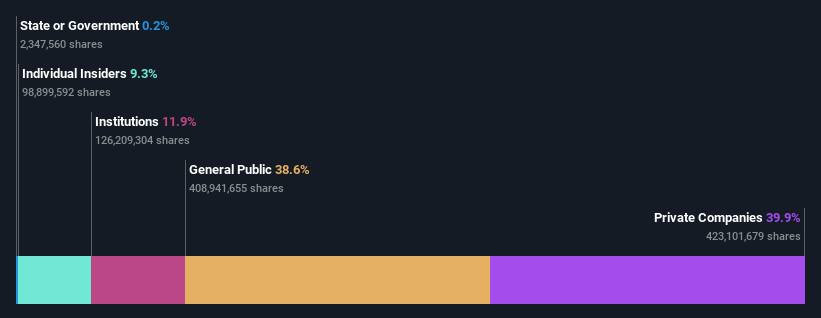- India
- /
- General Merchandise and Department Stores
- /
- NSEI:VAKRANGEE
Vakrangee Limited's (NSE:VAKRANGEE) market cap dropped ₹3.0b last week; Private companies bore the brunt

Key Insights
- Vakrangee's significant private companies ownership suggests that the key decisions are influenced by shareholders from the larger public
- The top 5 shareholders own 53% of the company
- Institutional ownership in Vakrangee is 12%
Every investor in Vakrangee Limited (NSE:VAKRANGEE) should be aware of the most powerful shareholder groups. And the group that holds the biggest piece of the pie are private companies with 40% ownership. That is, the group stands to benefit the most if the stock rises (or lose the most if there is a downturn).
And last week, private companies endured the biggest losses as the stock fell by 12%.
Let's take a closer look to see what the different types of shareholders can tell us about Vakrangee.
Check out our latest analysis for Vakrangee

What Does The Institutional Ownership Tell Us About Vakrangee?
Institutions typically measure themselves against a benchmark when reporting to their own investors, so they often become more enthusiastic about a stock once it's included in a major index. We would expect most companies to have some institutions on the register, especially if they are growing.
We can see that Vakrangee does have institutional investors; and they hold a good portion of the company's stock. This implies the analysts working for those institutions have looked at the stock and they like it. But just like anyone else, they could be wrong. When multiple institutions own a stock, there's always a risk that they are in a 'crowded trade'. When such a trade goes wrong, multiple parties may compete to sell stock fast. This risk is higher in a company without a history of growth. You can see Vakrangee's historic earnings and revenue below, but keep in mind there's always more to the story.

Hedge funds don't have many shares in Vakrangee. Vakrangee Holdings Private Limited is currently the largest shareholder, with 24% of shares outstanding. In comparison, the second and third largest shareholders hold about 12% and 6.5% of the stock. Dinesh Nandwana, who is the third-largest shareholder, also happens to hold the title of Member of the Board of Directors.
On looking further, we found that 53% of the shares are owned by the top 5 shareholders. In other words, these shareholders have a meaningful say in the decisions of the company.
Researching institutional ownership is a good way to gauge and filter a stock's expected performance. The same can be achieved by studying analyst sentiments. We're not picking up on any analyst coverage of the stock at the moment, so the company is unlikely to be widely held.
Insider Ownership Of Vakrangee
The definition of company insiders can be subjective and does vary between jurisdictions. Our data reflects individual insiders, capturing board members at the very least. The company management answer to the board and the latter should represent the interests of shareholders. Notably, sometimes top-level managers are on the board themselves.
Insider ownership is positive when it signals leadership are thinking like the true owners of the company. However, high insider ownership can also give immense power to a small group within the company. This can be negative in some circumstances.
Our most recent data indicates that insiders own some shares in Vakrangee Limited. As individuals, the insiders collectively own ₹2.0b worth of the ₹21b company. Some would say this shows alignment of interests between shareholders and the board. But it might be worth checking if those insiders have been selling.
General Public Ownership
With a 39% ownership, the general public, mostly comprising of individual investors, have some degree of sway over Vakrangee. This size of ownership, while considerable, may not be enough to change company policy if the decision is not in sync with other large shareholders.
Private Company Ownership
Our data indicates that Private Companies hold 40%, of the company's shares. Private companies may be related parties. Sometimes insiders have an interest in a public company through a holding in a private company, rather than in their own capacity as an individual. While it's hard to draw any broad stroke conclusions, it is worth noting as an area for further research.
Next Steps:
It's always worth thinking about the different groups who own shares in a company. But to understand Vakrangee better, we need to consider many other factors. Like risks, for instance. Every company has them, and we've spotted 2 warning signs for Vakrangee (of which 1 makes us a bit uncomfortable!) you should know about.
Of course this may not be the best stock to buy. Therefore, you may wish to see our free collection of interesting prospects boasting favorable financials.
NB: Figures in this article are calculated using data from the last twelve months, which refer to the 12-month period ending on the last date of the month the financial statement is dated. This may not be consistent with full year annual report figures.
New: Manage All Your Stock Portfolios in One Place
We've created the ultimate portfolio companion for stock investors, and it's free.
• Connect an unlimited number of Portfolios and see your total in one currency
• Be alerted to new Warning Signs or Risks via email or mobile
• Track the Fair Value of your stocks
Have feedback on this article? Concerned about the content? Get in touch with us directly. Alternatively, email editorial-team (at) simplywallst.com.
This article by Simply Wall St is general in nature. We provide commentary based on historical data and analyst forecasts only using an unbiased methodology and our articles are not intended to be financial advice. It does not constitute a recommendation to buy or sell any stock, and does not take account of your objectives, or your financial situation. We aim to bring you long-term focused analysis driven by fundamental data. Note that our analysis may not factor in the latest price-sensitive company announcements or qualitative material. Simply Wall St has no position in any stocks mentioned.
About NSEI:VAKRANGEE
Vakrangee
A technology company, provides banking, financial, insurance, ATM, e-commerce, and logistics services in India.
Flawless balance sheet with acceptable track record.
Similar Companies
Market Insights
Community Narratives





